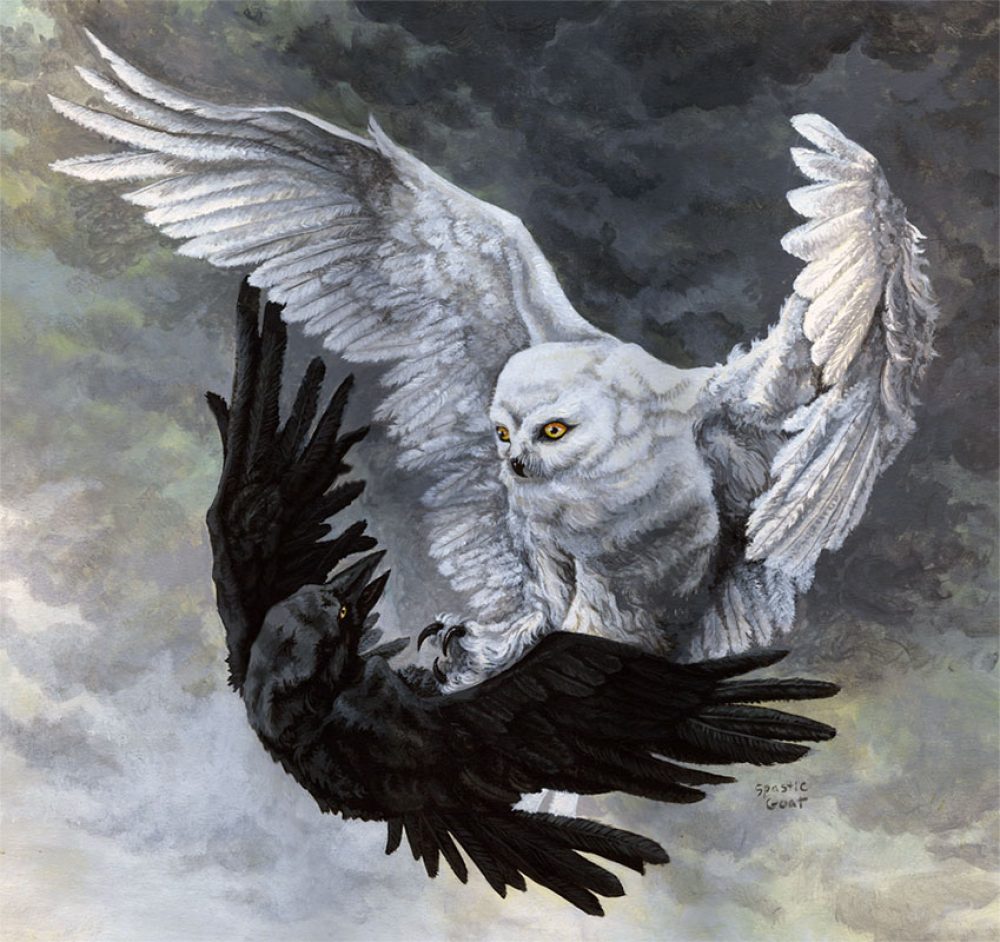Read the previous part here…
Work that is not completed fast, especially when it’s end is near, loses it’s essence to time. It becomes meaningless and a fruitless exercise.

MeghaVarna thought for a moment, and then said “Let’s do it. We will gather our forces, and attack right away…all of us will fly down to the enemy’s fort, and end this once and for all!”
And so all the crows – young, old, male, female, soldier, servant and king – everyone flew down to the fort of the owls, guided by Sthirajeevin, with burning sticks in their beaks, and dropped them on the ‘nest’ that Sthirajeevin had built at the entrance.
The nest went up in flames. Within minutes, the owls realized what was happening, but it was too late. Their only entrance was blocked by fire, and they were blind in the day anyway, so it would have been futile. The screamed and cried and remembered the words of Raktāksha, as they burnt to death. AriMardana watched his kin die in front of his eyes, and his last moments were filled with regret at not having listened to his most experienced minister. Not able to bear the shame, he consigned himself to the flames, thus bringing to an end the once-flourishing tribe of the owls.
Well, isn’t this the conclusion? After all, it all started with AriMardana attacking the crows, and now that he lay dead, the enmity did come to an end isn’t it?
In stories, as in life, the end is not the completion of a task, or a project, or the defeat of an enemy…the end is when you have derived adequate learnings from the experience. Sthirajeevin was a very experienced minister, and MeghaVarna was a good king, but what use would such an experience be, if there was no learning that could be derived from it?
Life is cyclical. What we do – good or bad, comes back in some shape or form. People call it karma, but then karma is action. It is inevitable. Even not doing anything, is a kind of karma. When you cannot avoid it, then how can you overcome it’s effects?
You actually cannot. You just have to ensure that you do a lot of good, much more than a very little bad (that is also inevitable). But that is not the discussion here. If you end up doing something bad, or making a mistake, how fast do you learn from it, and not repeat it again?
How do you ensure this? Think about it.
In Sthirajeevin’s case, he had a few things to speak about. And that forms the extended conclusion of this tantra. Yes, there are a couple of stories as well! But these words of wisdom are as important as the rest of the story, because they contain the learnings that we seek – and the points to ponder that help us grow as a person.
Keep reading!
The victorious MeghaVarna returned to the fig tree, their home, after vanquishing his enemy. This followers carried him to the throne, which was well-decorated with fresh flowers and incense. MeghaVarna called Sthirajeevin to his side, bowed to him, and said ” You have saved us from destruction and also finished our enemies. We are forever indebted to you….Tell us oh revered Sthirajeevin, how did you spend your days there? Did you feel afraid, or hesitant at any point in time? Did you not suffer? After all, the wise say that…
वर-मग्नौ प्रदीप्ते तु प्रपातः पुण्य-कर्मणाम् ।
न चारिजन-संसर्गो मुहूर्तम् अपि सेवितः ॥ २२४ ॥
vara-magnau pradīpte tu prapātaḥ puṇya-karmaṇām |
na cārijana-saṃsargo muhūrtam api sevitaḥ || 224 ||
Those who are righteous prefer to enter the fire and give up their lives, rather than stay in the company of their enemies, even if it is for an instant…
Sthirajeevin replied…
to be continued…
